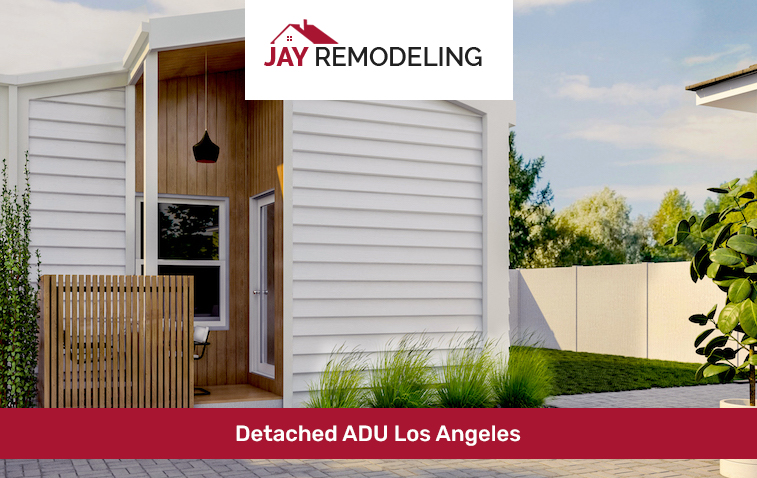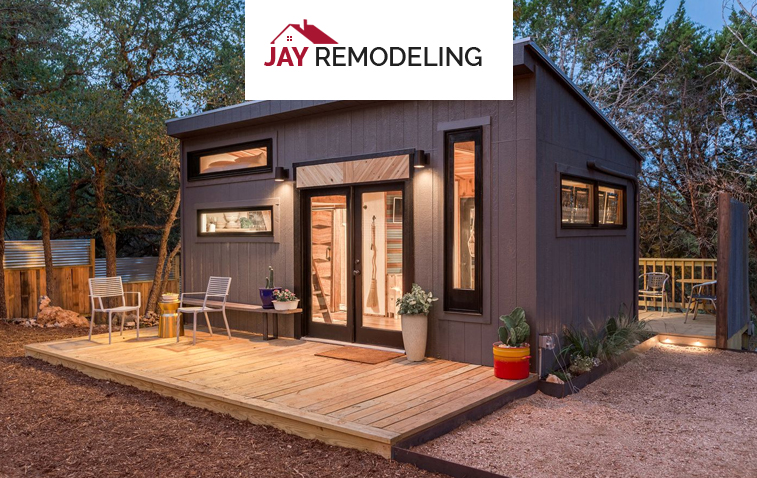Are you considering building a detached ADU in Los Angeles? This can be an exciting and rewarding project, but it’s important to understand the steps involved. From permits and zoning, there are several factors to consider before starting your project.
It’s important to have a clear understanding of the regulations, costs, and processes involved before starting your project. Consider factors such as budget, design, purpose, and materials when planning your project. Navigating permits and zoning regulations can also be complex, so it’s best with Jay Remodeling. Don’t forget to carefully consider financing options and plan for unexpected costs.
In this blog post, we’ll guide you through the process of building a detached ADU in Los Angeles and provide valuable tips on finding the perfect contractor for your project. Let’s get started!

In recent years, detached accessory dwelling units (ADUs) have become increasingly popular as a way for homeowners in Los Angeles to add extra living space or rental income potential to their properties. But before jumping into this type of project, it’s important to have a clear understanding of what a detached ADU is and the regulations surrounding its construction in Los Angeles.
A detached ADU, also known as a backyard cottage or granny flat, is a small secondary dwelling unit that is completely separate from the main house on a property. These units can range in size from 300-1200 square feet and typically include amenities such as a kitchen, bathroom, living space, and bedroom(s). Detached ADUs are often used for extended family members, guests, or as rental units.
In Los Angeles, detached ADUs must adhere to specific zoning and building codes set by the city. It’s important to research these regulations before beginning your project to ensure compliance and avoid any delays or fines.
Aside from the obvious benefits of additional space and potential rental income, there are many other advantages to having a detached ADU on your property in Los Angeles. Some of these include:
This refers to the rise in the monetary worth of a property due to factors like improvements, market conditions, or area development. A property with increased value can yield a higher return on investment if sold or rented.
This refers to the adaptability of a home to accommodate families of different generations living together. It often involves having adjustable spaces that can cater to the diverse needs and privacy of individuals across various age groups.
This concept relates to the ability of individuals to live in their own homes safely, independently, and comfortably, regardless of age, income, or ability level. It often involves home designs and community services that enable seniors to navigate their daily lives with ease.
These are financial advantages that may be available through certain tax deductions or credits. In real estate, these benefits could come from mortgage interest, property taxes, or costs related to home improvements and maintenance.
These refer to ecological practices implemented in a home to minimize harm to the environment. This could involve energy-efficient appliances, solar panels, water-saving fixtures, or the use of recycled or sustainable materials in construction.
With the high cost of housing in Los Angeles, adding a detached ADU to your property can also provide an affordable housing option for those looking to live in desirable areas without breaking the bank.
Before diving into your detached ADU project, there are some important factors you should consider:
As mentioned earlier, there are specific permits and zoning regulations in Los Angeles that must be followed when building a detached ADU. Your contractor should be familiar with these regulations and help guide you through the process.
The first step is obtaining a permit from the Department of Building Safety (LADBS). This will involve submitting plans for review and inspection by city officials. It’s important to note that some neighbourhoods may have additional zoning restrictions, so it’s best to consult with your contractor and the city before beginning the permitting process.
When it comes to choosing materials for your detached ADU in Los Angeles, you’ll want to consider both functionality and aesthetics.
For exterior walls and roofing, materials such as wood, brick, stucco, or metal are commonly used. Interior finishes like flooring, cabinetry, and countertops should also be carefully chosen based on durability and style preferences. Your contractor can help guide you in making the right choices that fit within your budget.
An Accessory Dwelling Unit (ADU) can range in cost from $80,000 to $350,000+ based on its size and design. The total cost of an ADU is influenced by various factors, including the type of ADU being constructed (Attached, Detached, or Garage Conversion), the accessibility of the construction site, and the specified quality of materials.
This wide range is due to the various factors mentioned above. The best way to get an accurate estimate for your specific project is to consult with Jay Remodeling.
The cost of building a detached ADU in Los Angeles can vary greatly depending on factors such as size, design, and materials used. Be sure to also account for any additional fees such as permits, inspections, and utility connections. It’s always best to plan for unexpected costs to avoid going over budget.

There are several options for financing a detached ADU project in Los Angeles:
It’s important to carefully consider your financial situation and choose the option that works best for you. Consulting with a financial advisor can also help determine the most feasible and cost-effective route for financing your detached ADU project. Contact us today to start your ADU project with confidence!
Building a detached ADU on your property in Los Angeles can be an exciting venture, but it’s important to have a clear understanding of the regulations, costs, and processes involved before jumping in. By doing thorough research, considering all factors, and choosing the right contractor, you can successfully add a valuable asset to your property with a detached ADU.
So whether you’re looking to add space for extended family members, generate rental income, or simply increase the value of your property, a detached ADU is a great solution in Los Angeles.
